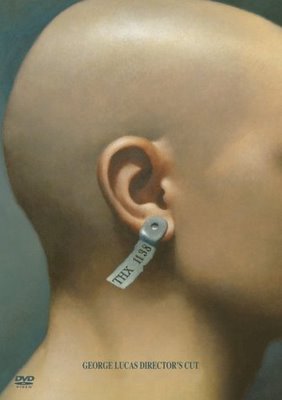Gadzooks, my blogging has really slowed down the last few days. Between work and visiting the kids in the hospital (where they will probably be for another week or so), I guess I’ve been busy.
 At any rate, I wanted to post a thought or two on the “director’s cut” of THX 1138 (1971), before I return the DVD to the library. I watched it with my wife a few nights ago, and I checked out almost all the extras (everything but the bonus audio tracks). And what leaps out at me the most is how George Lucas insists, on more than one occasion, that he wanted his first movie to be “real” like “a documentary from the future”, and so he shot the film in existing locations, etc. — yet the “director’s cut” is peppered with CGI images that were created just for the DVD.
At any rate, I wanted to post a thought or two on the “director’s cut” of THX 1138 (1971), before I return the DVD to the library. I watched it with my wife a few nights ago, and I checked out almost all the extras (everything but the bonus audio tracks). And what leaps out at me the most is how George Lucas insists, on more than one occasion, that he wanted his first movie to be “real” like “a documentary from the future”, and so he shot the film in existing locations, etc. — yet the “director’s cut” is peppered with CGI images that were created just for the DVD.
I have not seen the film since my high-school days, two decades ago, so my memory of it is pretty vague; and the version that I saw was on television, and was thus probably somewhat censored anyway; so I haven’t a clue just how extensive the changes are, between the original film and the “director’s cut”. Maybe Lucas has not only added footage, but has trimmed stuff out and moved things around, I don’t know. I did notice that he turned at least some of the “shell dwellers” into CGI animals, which is weird.
I do appreciate Lucas’s remark that he wasn’t very interested in “character” and suchlike, but in a more abstract kind of filmmaking. I think the film does work fairly well on that level. If only his Star Wars prequels had also abandoned any pretense of character development! One thing THX 1138 does have in common with Lucas’s Star Wars films, though, is its muddled philosophizing. It definitely feels like a glorified student film, like the work of a recent university graduate in his mid-20s.
Walter Murch makes some interesting comments about the sound editing. I believe he says he wanted the robots’ motorbikes to “scream”. I found myself wondering if his sound work on those machines had influenced the light cycles in Tron (1982).
I had no idea Caleb Deschanel was part of the American Zoetrope gang way back then. For a while now, of course, I have mainly thought of him as the cinematographer on Mel Gibson’s The Passion of the Christ (2004), and as the father of actress Zooey Deschanel, who I adore. Learn something new every day.
UPDATE: Oh, and why is consumerism such a big bogeyman in this film? Never mind that it’s presented, improbably, as something that people are forced to do by the totalitarian state, rather than something that grows out of a liberal capitalist economy or whatever; that’s just one of Lucas’s philosophical incoherences. I just find it strange that Lucas, that owner of lucrative pop-culture franchises, that self-proclaimed “toymaker”, would still pretend to take a bold stand against it. Not inexplicable, just strange.
I also find intriguing Robert Duvall’s remarks, in the making-of featurette, about how good it was to work with Lucas — because he gave the actors space! Duvall, evidently, is one of those actors who doesn’t need a whole lot of direction to turn in a good performance. And that makes him rare among Lucas’s alumni.
Oh, and unless someone says something in the commentary, there is Not One Word about the CGI revisions in the extras. It is as though Lucas wanted us to think his film had always been this way.











